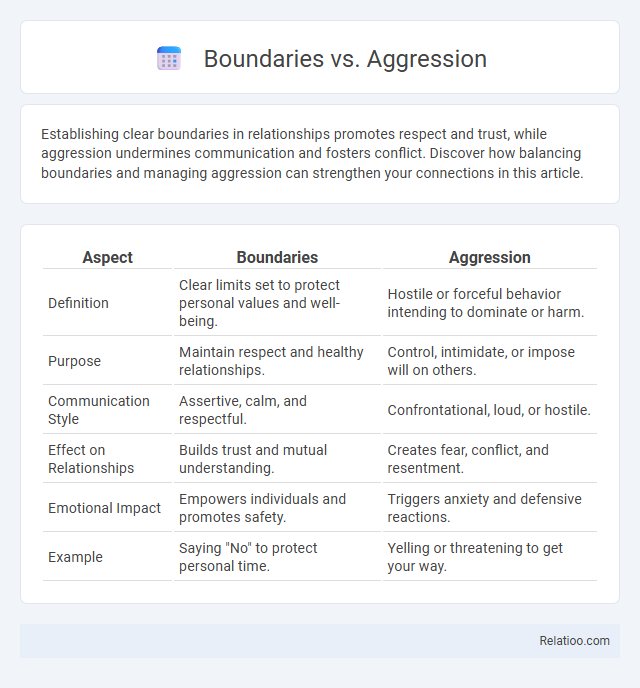Establishing clear boundaries in relationships promotes respect and trust, while aggression undermines communication and fosters conflict. Discover how balancing boundaries and managing aggression can strengthen your connections in this article.
Table of Comparison
| Aspect | Boundaries | Aggression |
|---|---|---|
| Definition | Clear limits set to protect personal values and well-being. | Hostile or forceful behavior intending to dominate or harm. |
| Purpose | Maintain respect and healthy relationships. | Control, intimidate, or impose will on others. |
| Communication Style | Assertive, calm, and respectful. | Confrontational, loud, or hostile. |
| Effect on Relationships | Builds trust and mutual understanding. | Creates fear, conflict, and resentment. |
| Emotional Impact | Empowers individuals and promotes safety. | Triggers anxiety and defensive reactions. |
| Example | Saying "No" to protect personal time. | Yelling or threatening to get your way. |
Understanding Boundaries: Definition and Importance
Understanding boundaries involves recognizing personal limits that protect your emotional and physical well-being while fostering respectful interactions. Setting clear boundaries prevents aggression by establishing what behavior is acceptable, reducing conflicts and promoting healthier relationships. Effective boundary management helps you navigate confrontation constructively, ensuring communication remains assertive without escalating into hostility.
What Constitutes Aggressive Behavior?
Aggressive behavior involves actions intended to cause harm or assert dominance through intimidation, physical force, or verbal hostility, often violating personal boundaries. Unlike setting clear boundaries, aggression disregards mutual respect and escalates conflict instead of resolving it. Understanding your own triggers and recognizing signs of aggression can help prevent confrontations and maintain healthy interactions.
Key Differences Between Boundaries and Aggression
Boundaries are clear, respectful limits set to protect personal values and well-being, whereas aggression involves hostile or forceful behavior intended to dominate or harm others. Boundaries promote healthy communication and self-respect, while aggression often leads to conflict, fear, and damaged relationships. Understanding this key distinction helps individuals assert themselves effectively without escalating tensions or causing harm.
The Role of Communication in Setting Boundaries
Effective communication plays a crucial role in setting boundaries by clearly expressing personal limits and expectations, preventing misunderstandings that can lead to aggression or confrontation. Assertive communication techniques enable individuals to maintain respect while protecting their needs, reducing the likelihood of conflict escalation. Establishing boundaries through open dialogue fosters mutual understanding and promotes healthy interpersonal relationships.
How Unclear Boundaries Lead to Aggression
Unclear boundaries often create confusion and frustration, which can escalate into aggression when individuals feel their personal space or values are being disrespected. Without clear limits, your interactions may inadvertently provoke defensive or hostile reactions as others struggle to understand acceptable behavior. Establishing firm, transparent boundaries is essential to prevent aggressive confrontations and foster respectful communication.
Healthy Boundary Setting Techniques
Healthy boundary setting techniques involve clear communication of your limits and needs without hostility, using assertive yet respectful language to maintain relationships. Understanding the difference between boundaries, aggression, and confrontation helps you protect your well-being without escalating conflicts or provoking defensiveness. Consistent practice of expressing your feelings calmly and listening actively fosters mutual respect and prevents misunderstandings.
Recognizing Aggressive Patterns in Relationships
Recognizing aggressive patterns in relationships is crucial for maintaining healthy boundaries and avoiding unnecessary confrontation. Your ability to identify behaviors such as verbal hostility, intimidation, or controlling actions enables you to protect your emotional well-being and assert your limits effectively. Clear understanding of these aggressive signals helps prevent escalation and supports constructive communication.
The Impact of Aggression on Personal and Professional Life
Aggression often disrupts personal relationships and undermines professional collaboration by creating a hostile environment that erodes trust and respect. Maintaining clear boundaries helps you prevent aggressive behaviors from escalating into conflicts that damage your reputation and mental health. Understanding the difference between assertive boundaries and harmful aggression empowers you to foster healthier interactions both personally and professionally.
Strategies to Prevent Aggression When Enforcing Boundaries
Establish clear, respectful communication to assert your boundaries without provoking aggression, using calm and firm language to express your needs. Employ active listening to understand the other person's perspective and reduce tension, fostering a cooperative rather than confrontational environment. Your consistent non-verbal cues and emotional regulation signal confidence and control, which can prevent escalation and maintain healthy interactions.
Building Respect Through Assertiveness, Not Aggression
Establishing clear boundaries fosters respect by communicating your needs calmly and confidently, which contrasts sharply with aggression that often provokes conflict and misunderstanding. Assertiveness empowers you to stand up for yourself while maintaining dignity and promoting positive relationships. Your ability to set limits without hostility encourages mutual respect and effective confrontation that resolves issues rather than escalates them.

Infographic: Boundaries vs Aggression
 relatioo.com
relatioo.com